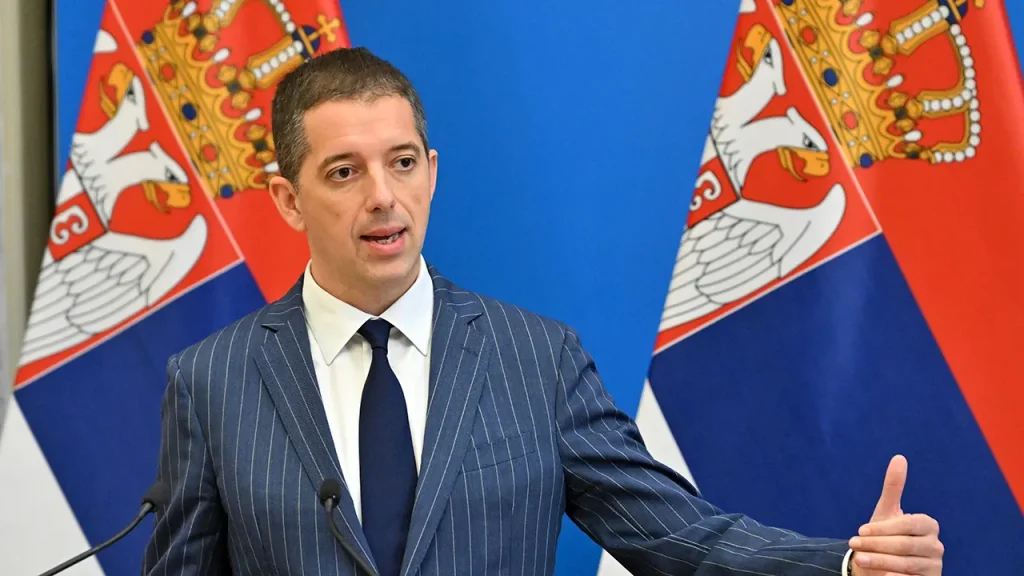Serbia Offers to Broker Peace Talks Between Russia and Ukraine
In a significant diplomatic overture, Serbian Foreign Minister Marko Djuric has extended an offer to host peace negotiations between Ukraine and Russia, highlighting Serbia’s unique position as a nation maintaining friendly relations with both conflicting parties. In an exclusive interview with Fox News Digital, Djuric emphasized that Serbia stands ready to provide “good services” to facilitate dialogue aimed at ending the devastating conflict that has caused extensive destruction and loss of life. The Foreign Minister reaffirmed Serbia’s principled support for “territorial integrity and sovereignty of all states in line with their U.N. borders,” explicitly including Ukraine in this statement. This peace initiative comes at a crucial time, especially after plans for a summit between President Donald Trump and Russian President Vladimir Putin in Hungary were recently shelved.
Serbia’s position as a potential mediator might surprise some international observers given the country’s historic ties with Russia, which are deeply rooted in cultural and religious connections through the Serbian Orthodox Church. While Belgrade has supported UN resolutions condemning Russia’s invasion and annexation of Ukrainian territories, it has conspicuously refused to join Western sanctions against Moscow. Djuric countered potential skepticism by pointing out that both Ukraine and Russia support Serbia’s territorial integrity regarding Kosovo—a region that remains a sensitive issue for Belgrade since the 1999 NATO bombing campaign that ended the war between Serbian government forces and ethnic Albanian separatists. Despite Kosovo declaring independence, Serbia continues to consider it a Serbian province, and this territorial dispute remains central to Serbian foreign policy considerations.
When addressing questions about Serbia’s commitment to European unity, Djuric defended his country’s independent foreign and security policy, describing it as deeply rooted in Serbian history and essential to maintaining national sovereignty. He emphasized Serbia’s growing strategic partnership with the United States, noting there exists “bipartisan consensus” in America supporting this relationship. In a revealing statement about Serbian public sentiment, Djuric claimed that former President Trump enjoys unprecedented popularity in Serbia, with “more than 71% of Serbs having a very favorable opinion” of him—a level of support that Djuric characterized as “unparalleled” compared to other European countries. This strong public approval, he suggested, provides “fertile ground for further growth” in US-Serbian relations going forward.
However, Serbia’s deepening ties with China have raised concerns in Washington and other Western capitals. The United States recently sanctioned Serbia’s Russian-owned oil company, Naftna Industrija Srbije (NIS), which serves as the country’s primary supplier of oil and gasoline. Serbia’s relationship with Beijing extends beyond economic cooperation into military dimensions, with China conducting exercises in Serbia despite warnings from the European Union. Serbia has purchased missile defense systems from China, and according to the Center for European Policy Analysis, Beijing has invested more than $10 billion in Serbian infrastructure projects over the past 15 years. Djuric acknowledged these ties, noting that China supports Serbia’s position on Kosovo and recognizes its UN-defined borders, making Beijing “an important partner” for Belgrade. Nevertheless, he characterized the great power competition between the US and China as “above the pay grade of a small Balkan nation,” indicating Serbia’s pragmatic approach to international relations while focusing primarily on its economic development.
On the domestic front, Serbia has faced nearly a year of student-led anti-corruption protests demanding accountability following a tragic railway station collapse in Novi Sad that claimed sixteen lives. European Union officials have criticized Serbian authorities for their harsh response to these demonstrations. Addressing these concerns, Djuric expressed a commitment to establishing “honest dialogue” with protesters and finding ways to de-escalate tensions. He emphasized that the government respects citizens who disagree with its policies and believes Serbia is “mature enough to have a dignified, decent, democratic dialogue.” This approach reflects Serbia’s attempt to navigate internal dissent while maintaining its international standing.
The Foreign Minister pointed to government changes made in response to the Novi Sad tragedy as evidence of accountability, noting that ministers had been replaced, some held responsible and even imprisoned. Djuric highlighted the appointment of Professor Djuro Macut as the current prime minister, describing him as a university professor who shares President Aleksandar Vučić’s vision of unifying Serbia and overcoming political divisions. According to Djuric, the government aims to create “a society based on dialogue and social cohesion rather than polarization,” suggesting that Belgrade is attempting to balance its complex international relationships with domestic reforms. As Serbia continues to position itself between East and West—maintaining ties with Russia and China while nurturing its relationship with the United States—its offer to mediate in the Ukraine conflict represents an ambitious diplomatic initiative for a country seeking to enhance its international standing despite limited size and resources.













